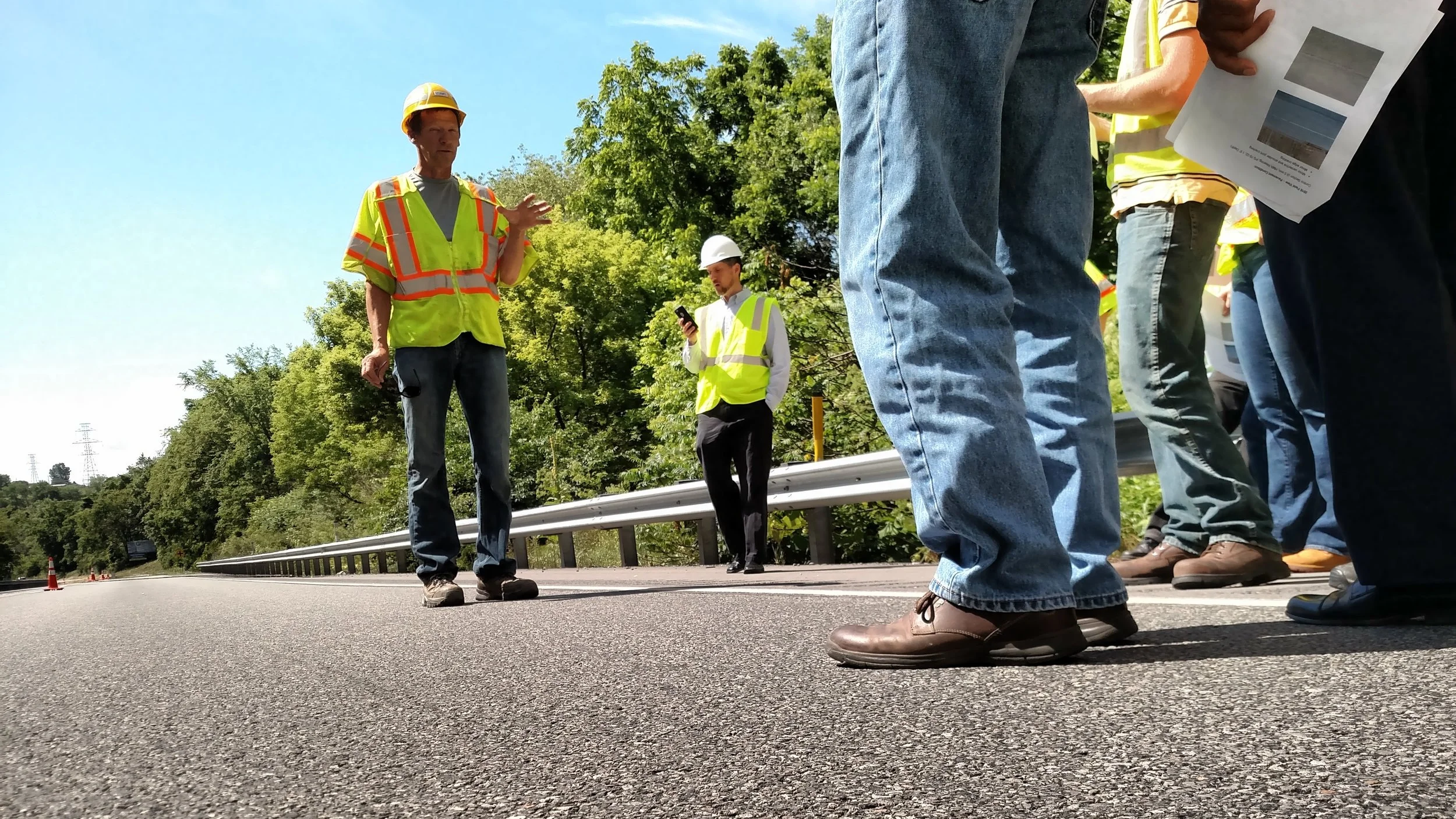
Investigation of Wildfire Impacts on Pavements
As part of its ongoing Indefinite Delivery Indefinite Quantity (IDIQ) with the Federal Highway Administration (FHWA), Applied Pavement Technology, Inc. (APTech) was recently awarded a contract to investigate and document the direct and indirect impacts of wildfires on pavement infrastructure.
This effort involves completing a comprehensive literature search and a series of interviews with selected agency personnel who frequently contend with wildfire emergencies and their associated effects. The support for this project will cut across a range of administrative, technical, and outreach activities that will result in the development of a set of reports and associated outreach materials.
Key Tasks
Literature review summary report
Identifying case study states
Interviewing case study states
Development of project summary report
Development of tech brief
Conduction of national-level webinar
The APTech team’s work on this project will not only present the current state of knowledge on wildfire impacts on pavements, but also set the stage for future work in this area by identifying critical information gaps and research needs.

Small Unmanned Aircraft Systems for Pavement Inspection
APTech, as a subcontractor to Iowa State University, is part of a team evaluating the use of small Unmanned Aircraft Systems (sUAS) to conduct airfield pavement inspections. The project includes a comprehensive review of current and emerging sUAS platforms and sUAS-mounted sensor technologies, along with the deployment of technology-platform combinations on airfield pavements to evaluate their technical specifications (i.e., performance and required criteria). This project is also providing an overview of potential standard processes and procedures for the use of sUAS for airport pavement inspection.
APTech contributed ground-truth survey results as part of a detailed field demonstration plan carried out at airports in four states. The practical lessons learned from the field demonstration projects will be captured, analyzed, and ultimately used to provide inputs to the development of a draft Advisory Circular addressing the use of sUAS to supplement airport pavement management program inspections. A final report including the research methodology and findings for the project, as well as an executive summary and list of recommendations for further research needs, will be submitted to the Federal Aviation Administration.
Key tasks include review of sUAS platforms, review of sUAS-mounted sensor technology, deployment of technology-platform combinations, development of standard sUAS processes and procedures for airport pavement inspection, contribution to ground-truth survey results, and development of reports.
Ultimately, expected outcomes from this research will include contributing to the development of standard processes and procedures, as well as technical specifications, for various types of sUAS and sUAS-mounted sensor technologies to consistently conduct safe, reliable, and effective sUAS-based airport pavement management inspections.

NCHRP 08-109: Updating the AASHTO TAM Guide — A Focus on Implementation
As a subcontractor, APTech was selected by the National Cooperative Highway Research Program (NCHRP) to update the Transportation Asset Management (TAM) Guide published by the American Association of State Highway and Transportation Officials (AASHTO). This guide provides methods to approach and implement asset management at state departments of transportation (DOTs).
In the first phase of the effort, the team assessed the effectiveness of the previous AASHTO Asset Management Guide and developed strategies for improving the Guide’s effectiveness. The second phase of the project focused on writing the content of the guide, presenting the guidance in both print and digital formats, and implementing a communication and outreach plan to disseminate the new guide to relevant audiences. Guidance included the following topics: TAM Strategy and Planning, Organization and People, Maximizing the Performance of Transportation Assets, Resource Allocation, Monitoring and Adjustment, and Information and Systems.
The resulting Guide is now available in a pdf format and in an online, searchable tool through AASHTO. As part of the project, APTech supported the design and delivery of an interactive workshop at the Transportation Research Board’s Annual Meeting in which participants worked in teams using the guide to develop solutions to practical asset management challenges.

FHWA SHRP 2 R21 Implementation Support: New Composite Pavement Systems
The FHWA has an ongoing interest in developing and deploying technologies to support improved concrete pavement performance and longevity. In support of these goals, the FHWA is conducting an indefinite delivery/indefinite quantity (IDIQ) project to promote and advance recommended best practices for the design, construction, repair, and rehabilitation of concrete pavements. Under Task Order 6 of the IDIQ, APTech supported the FHWA in implementing the new composite pavement system technologies developed under the SHRP2 R21 study.
Under this contract, we:
assisted four state highway agencies (SHAs) in the planning, design, and construction of new composite pavement systems and documented the project installations through detailed case studies.
worked with the California Department of Transportation to host a multi-state showcase on composite pavements that included a field demonstration of a two-lift concrete pavement project on I-210 north of Los Angeles.
developed comprehensive training materials on the design and construction of composite pavement systems and delivered it to highway agencies across the country.
worked with the Virginia Department of Transportation to organize and facilitate a multi-state peer exchange meeting to share knowledge on the applicability of and implementation strategies for composite pavement systems.
participated in various regional and national outreach activities to share information on composite pavement systems.

Ohio DOT Longitudinal Joint Repair Best Practices
The Ohio DOT maintains 49,078 lane miles of highway, and has identified longitudinal joint failure of their asphalt pavements as a systemic weakness. To counter that, APTech worked with ODOT to develop guidance on how to choose the most appropriate longitudinal joint repair method and how to perform it effectively and at the optimum time to produce the greatest return-on-investment.
Our work included:
Evaluating the Ohio DOT’s current longitudinal joint repair processes.
Conducting a comprehensive study of longitudinal joint repair practices by other DOTs.
Modifying existing construction specifications and designer guidance.
Developing a guidance document to assist maintenance managers in making cost-effective repair decisions.
Developing a decision tree and treatment selection tool to be included in the Ohio DOT pavement management system.
Preparing a project report to summarize findings and provide recommendations.

Wisconsin DOT Non-Cementitious Repair Project
WisDOT’s high-priority roadways require repairs to be completed during off-peak hours with minimal lane closure durations (typically 6 to 8 hours for night-time closures). These short closure times severely limit the ability to use many conventional cementitious repair materials and methods on their concrete pavements. As a result, WisDOT has typically resorted to using asphalt concrete or rapid-setting cementitious materials for repairs of PCC pavements, neither of which has consistently resulted in durable or long-lasting repairs.
WisDOT selected Applied Pavement Technology, Inc. (APTech) to evaluate the laboratory and field performance of selected non-cementitious repair materials they have been using over the last few years and provide guidance on the selection and use of these materials for concrete pavement partial-depth repair applications.
Our work included:
Conducting field evaluations of selected non-cementitious repair materials to document prevailing condition of repair materials and surrounding concrete pavement.
Conducting coring and non-destructive testing to assess the bond condition between repair material and underlying concrete pavement.
Conducting laboratory testing to study bond and dimensional stability of repair materials at various temperatures.
Developing project report to assist WisDOT in improving policy and specifications related to non-cementitious repair materials.
View the project report here.

FHWA Sustainable Pavements Program
For over 10 years, APTech supported the Federal Highway Administration (FHWA) in the administration of its Sustainable Pavements Program through two separate competitively bid indefinite delivery/indefinite quantity contracts. In this capacity, we were responsible for carrying through FHWA initiatives in pavement sustainability and worked with a broad-based team to accomplish them. This included:
seeking stakeholder involvement to help promote concepts of sustainability,
developing specific guidance on more sustainable pavement practices, and
sponsoring outreach programs and technology transfer activities to share the latest information on the FHWA’s program.
A number of key task orders have been executed under each contract for this program, each led by APTech and supported by a core group of technical experts who combine expertise in pavement design, construction, and materials with various components of sustainability.
Under the most recent Sustainable Pavements Program contract, seven task orders were issued.
Task Order 1: Sustainable Pavements Program Roadmap
We developed a strategic Roadmap to provide a 5- to 10-year strategic direction for the FHWA’s Sustainable Pavements Program. The Roadmap focused on pavement sustainability in the areas of design, construction, preservation, and maintenance of asphalt and concrete pavements, and was designed to:
Work within the broader industry context of improving pavement sustainability
Be guided by the Program’s current purpose (defined as being to advance the knowledge and practice of sustainability related to pavements)
Concentrate specifically on topics and deliverables through which the FHWA can have real impact given its current scope and authority. The Sustainable Pavements Technical Working Group (SPTWG) was engaged in the effort to provide stakeholder feedback.
Task Order 2: Establishment, Organization, and Coordination of the SPTWG
We coordinated and provided support for the SPTWG, a stakeholder group providing input to the FHWA on the program. We scheduled and organized meetings, provided travel support to eligible SPTWG meetings, facilitated the meetings, and documented the overall results and action items. A total of 11 meetings of the SPTWG were conducted from 2016 to 2021, the last three in virtual format.
Task Order 3: Technology Transfer Toolbox
APTech provided technology transfer support to the FHWA on the subject of sustainable pavements and materials. This support included:
Preparation of ten technical presentations on various aspects of pavement sustainability,
Development of three Technical Briefs on topics related to pavement and materials sustainability, and
Continued development, maintenance, and population of the FHWA sustainable pavements website.
Together, these various activities became a "technology transfer toolbox" that supports FHWA in sharing pavement sustainability information to the at-large highway community.
Task Order 4: Sustainable Pavements Case Studies
APTech developed a series of case studies that highlight sustainable pavement technologies that were featured in the program’s Reference Document. These were defined as a practice, procedure, or innovation with positive sustainability impacts, and a total of ten case study reports were produced: In-Place and Central-Plant Recycling of Asphalt Pavements, Use of Blended Cements, Sustainability Rating Systems, Perpetual Asphalt Pavements, Long-Life Concrete Pavements, Inverted Pavements, Superpave5 Asphalt Surface Mix Design, Stone Matrix Asphalt and Open-Graded Friction Courses, Concrete Pavement Texturing, and Use of Recycled Concrete Aggregates.
Task Order 5: Environmental Impact Benchmarking Tool
Under this task order, we developed a Microsoft Excel-based tool (LCA PAVE) to aid agencies in assessing, benchmarking, and communicating the environmental impacts of the materials and construction processes associated with new pavement construction, reconstruction, rehabilitation, maintenance, and preservation. The tool has the ability to consider a range of environmental impact indicators and generates a multitude of output summary tables and graphics, all of which can be presented in a report template that is customizable by the highway agency. The LCA PAVE tool plays a critical role in the U.S. Department of Transportation’s BUY CLEAN initiative.
The success of APTech’s work was recently rewarded with a new follow-on contract for LCA PAVE technical support, enhancements, and outreach.
Task Order 6: Sustainable Pavements Education and Outreach
We helped the FHWA advance the state of sustainable pavement practices through a strategic marketing and outreach campaign. A series of marketing and outreach materials were developed to educate stakeholders on pavement sustainability and encourage them to use resources and tools produced under the Sustainable Pavements Program. Some of these resources included:
Several Tech Briefs on Environmental Product Declarations (EPDs)
Two videos highlighting asphalt and concrete recycling, respectively, and
Several flyers and one-pagers on various sustainability related topics.
Two webinar series—one that highlighted ways agencies can improve the sustainability of their pavements, and one on the use of the LCA PAVE tool developed under Task Order 5.
Task Order 7: Pavement Resilience Guidebook
In this task order, APTech examined the role of pavement resilience in addressing a number of emerging climate stressors and developed a summary document describing the current state of knowledge, practice and future needs. This information in our report was based on:
Key national and international climate documents,
An FHWA approach to resilience,
The results of an unpublished literature review, and
The findings from two FHWA-sponsored Peer Exchanges on pavement resilience held in late 2020.








